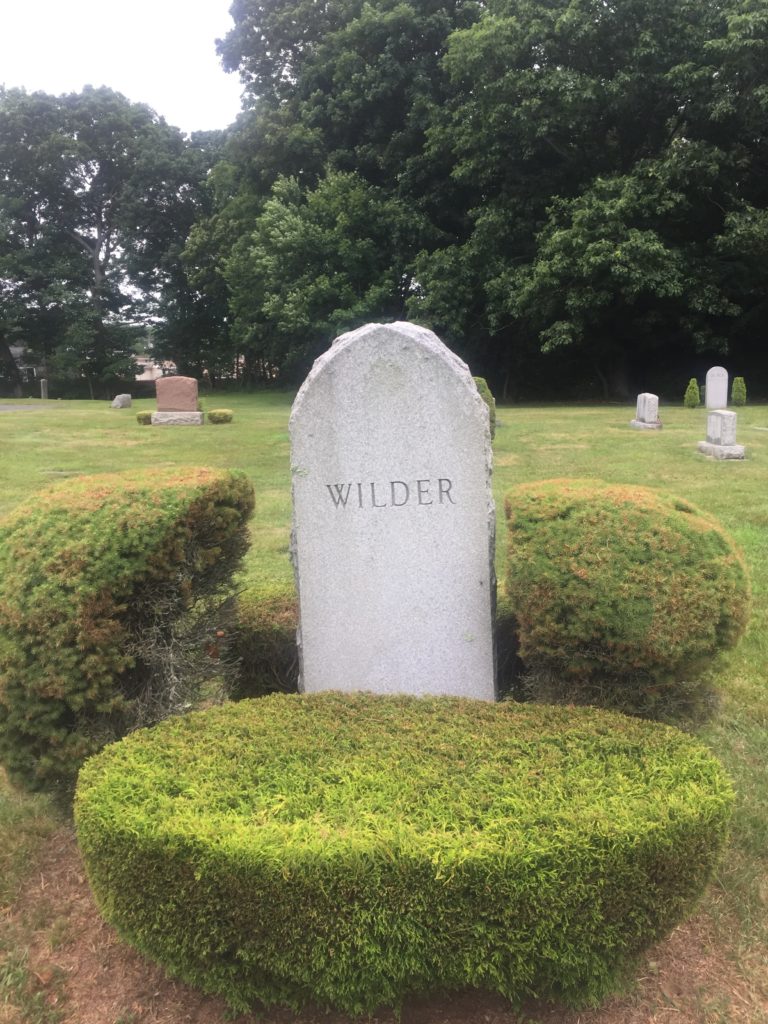Erik Visits an American Grave, Part 744
This is the grave of Thornton Wilder.

Born in Madison, Wisconsin in 1897, Wilder grew up pretty wealthy. His father was an influential Republican newspaper editor who Theodore Roosevelt named as Counsel-General to Hong Kong in 1906. This meant that young Thornton spent quite a bit of time in China. His father was assigned to Hong Kong until 1909 and then Shanghai until 1914. But the family returned to the U.S. in 1912, where he went to boarding school at The Thatcher School in Ojai, California and then high school in Berkeley. Wilder was briefly in the military in World War I, went to college at Oberlin, and then transferred to Yale, where he graduated from in 1920.
After college, Wilder traveled in Europe, studying architecture. He then taught French at a school in New Jersey. He had also started writing and this would, of course, be his future. His first novel, Cabbala, was published in 1926. His second, The Bridge of San Luis Rey, won the Pulitzer Prize in 1927. Many consider this to be the progenitor of the most disaster genre in art, with its multiple characters affected by the disaster they are sharing.
Wilder also wrote a tremendous number of plays, which eventually became a bigger part of his writing than the novels. This included his most famous work, Our Town, published in 1938. This won the Pulitzer for Drama. He would win that award again in 1943 for The Skin of Our Teeth. Alfred Hitchcock asked him to write the screenplay for Shadow of a Doubt, which he did, though others then worked with it. He translated Sartre into English and wrote librettos for operas. Throughout his career, Wilder was heavily influenced by existentialism and using mundane characters to meditate on the biggest themes of human existence. His last major work was The Eighth Day, which won the National Book Award in 1964.
During World War II, Wilder volunteered and became a successful officer in the U.S. Army Air Force intelligence. He spoke at least four languages fluently, so one can see what kind of value he would have. He mostly was in North Africa and reached the rank of lieutenant colonel. After the war, he taught college. He probably loved teaching more than he did writing and continued to teach long after he needed to for his career.
Wilder was also a semi-closeted homosexual, which was risky even for major artists in these years, and, it seems rarely had relationships with men. He never wrote of it or acknowledged it, even around his other queer friends such as Gertrude Stein. Ultimately, he was known as a private person who had trouble with close personal relationships but who was also gregarious and extremely energetic; some compared him to Theodore Roosevelt when he was younger for the latter.
Here is a good interview with Wilder from the Paris Review in 1950. And here is a televised interview from 1952.
If this discussion of Wilder seems a bit more superficial than normal, that’s because I have a confession to make. I have never read any Thornton Wilder. I am not quite sure how this has happened. There aren’t many major American writers from this era that I am completely unfamiliar with. But there’s a lot of books out there I suppose.
Thornton Wilder is buried in Mount Carmel Cemetery, Hamden, Connecticut.
If you would like this series to visit other American playwrights, you can donate to cover the required expenses here. Arthur Miller is in Roxbury, Connecticut and August Wilson is in Sharpsburg, Pennsylvania. Previous posts in this series are archived here.


